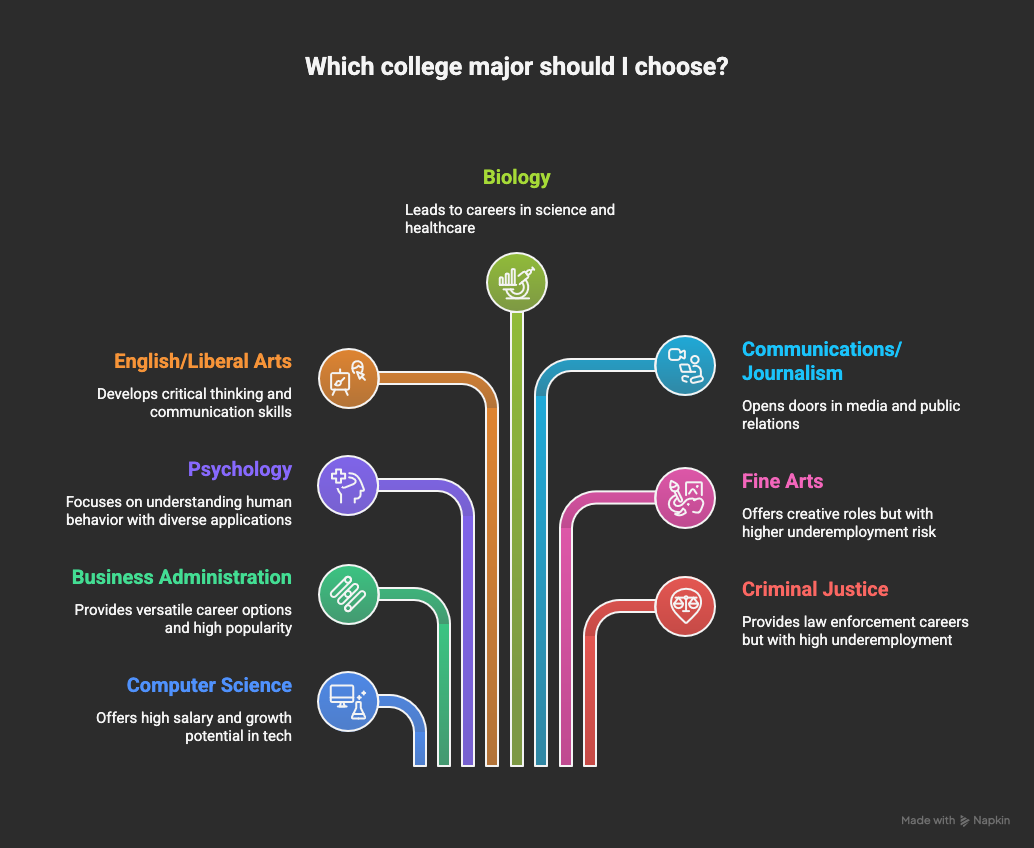How can your college major shape your career path?
Every degree unlocks unique career opportunities — from high-paying, tech-driven paths in computer science to people-centered roles in psychology, education, or communications. Understanding the industries, growth trends, and transferable skills tied to your major can help you align your studies with meaningful, sustainable career goals. Whether you aim for business leadership, creative work, or public service, the right strategy can turn your major into a launchpad for long-term success.
Choosing a college major is one of the most important career decisions students make, and the impact extends far beyond graduation.
According to the U.S. Bureau of Labor Statistics, individuals with a bachelor’s degree earn a median weekly wage of $1,493, compared to $899 for those with only a high school diploma - a 66% difference in earnings potential.
But beyond pay, each degree opens distinct pathways - from high-tech innovation in computer science to people-focused careers in psychology or communications.
In this guide, we break down what you can do with some of the most popular college majors, exploring job options, growth trends, and insights that can help you align your education with your career goals.
What Can I Do With a Computer Science Degree?
A computer science degree can lead to a variety of high-demand careers in the tech industry and beyond.
With a median salary of $136,620 and a projected growth of 23% through 2032, according to Research.com, this field offers both financial stability and opportunities for innovation.
Here are 5 roles you can pursue with a computer science degree:
- Software Developer: You'll be responsible for designing, developing, and maintaining software applications, from mobile apps to large-scale enterprise systems.
- Cybersecurity Analyst: In this role, you'll protect computer networks and systems from security breaches by monitoring for threats and implementing security measures.
- Data Scientist: Data scientists use analytical and programming skills to extract insights from large datasets and help organizations make data-driven decisions.
- AI/Machine Learning Engineer: You will design and build artificial intelligence models and systems using machine-learning algorithms. This often includes managing system performance and memory usage, such as understanding how to free up RAM when training large models or running complex pipelines.
- Video Game Developer: This role involves writing the code that brings video game concepts to life, from character movements to in-game physics.
Pro Tip: To enhance your resume, consider contributing to open-source projects or creating a portfolio of your work.
Is a Business Administration Degree a Good Investment?
Yes, a business administration degree is a solid investment.
Business is the most popular field of study in the United States, with 375,400 bachelor's degrees conferred in 2021-22, according to the National Center for Education Statistics.
Here are 5 roles you can pursue with a business administration degree:
- Management Analyst: Also known as management consultants, you'll help organizations improve their efficiency and profitability by analyzing data and recommending solutions.
- Human Resources Specialist: HR specialists are responsible for recruiting, hiring, and training employees, as well as handling employee relations and benefits.
- Operations Manager: This role involves overseeing the production of goods or services to ensure the organization is running as efficiently as possible.
- Marketing Manager: You will be responsible for planning and executing marketing campaigns to promote a company's products or services.
- Financial Analyst: Financial analysts guide businesses and individuals in making investment decisions by assessing the performance of stocks, bonds, and other investments.
What Can I Do With a Psychology Degree?
A psychology degree provides a deep understanding of human behavior, making it a valuable asset in many fields.
While many graduates go on to become counselors or therapists (which often requires a graduate degree), there are many other career paths to explore.
Here are 5 roles you can pursue with a psychology degree:
- Marketing Research Analyst: You'll use your understanding of human behavior to help companies understand their customers and market their products more effectively.
- User Experience (UX) Researcher: UX researchers study how people interact with products to identify areas for improvement and create a better user experience.
- Human Resources Generalist: You will handle a wide range of HR tasks, including recruiting, employee relations, and benefits administration, using your knowledge of human behavior.
- Sales Representative: This role involves selling products or services to customers, leveraging psychological principles to understand customer needs and build rapport.
- Social Worker: Social workers help individuals and families cope with challenges in their lives, providing support and resources to improve their well-being.

Are English and Liberal Arts Degrees Still Relevant?
Yes, English and liberal arts degrees are still highly relevant in today's job market.
These majors develop strong critical thinking, communication, and problem-solving skills, which are in high demand by employers.
Here are 5 roles you can pursue with an English or liberal arts degree:
- Content Strategist: You'll develop and manage a company's content marketing efforts, including creating and editing blog posts, articles, and other content.
- Public Relations Specialist: PR specialists help organizations build and maintain a positive public image by writing press releases and managing media relations.
- Grant Writer: This role involves writing proposals to secure funding for non-profit organizations and other institutions.
- Paralegal: You will support lawyers by conducting legal research, drafting documents, and organizing files for cases.
- Technical Writer: Technical writers create instruction manuals, how-to guides, and other documents to communicate complex and technical information more easily.
What Career Paths Can a Biology Degree Lead To?
A biology degree can be a stepping stone to a wide range of careers in science and healthcare. While many biology majors go on to medical school or other graduate programs, there are many other options available.
Here are 5 roles you can pursue with a biology degree:
- Environmental Scientist: You'll use your knowledge of the natural sciences to protect the environment and human health from issues like pollution and climate change.
- Pharmaceutical Sales Representative: In this role, you'll use your scientific background to sell medications and other pharmaceutical products to healthcare professionals.
- Forensic Science Technician: You will collect and analyze physical evidence from crime scenes to help law enforcement solve cases.
- Genetic Counselor: Genetic counselors advise individuals and families about their risk for inherited conditions, such as genetic disorders and birth defects.
- Medical and Health Services Manager: This role involves planning, directing, and coordinating the business activities of healthcare providers.
What Can I Do With a Communications or Journalism Degree?
A communications or journalism degree can open the door to a variety of careers in media, public relations, and marketing. The skills you'll gain in writing, editing, and storytelling are highly transferable.
Here are 5 roles you can pursue with a communications or journalism degree:
- Public Relations Specialist: PR specialists help organizations build and maintain a positive public image through media outreach and communication campaigns.
- Social Media Manager: You will be responsible for a company's social media presence, creating content, interacting with followers, and running ad campaigns.
- Content Marketer: This role involves creating and distributing valuable content to attract and retain a clearly defined audience.
- Corporate Communications Specialist: You will manage internal and external communications for a company, ensuring consistent messaging across all channels.
- Event Planner: Event planners coordinate all aspects of professional meetings and events, from scouting locations to managing logistics.
Is a Fine Arts Degree a Risky Investment?
A fine arts degree can be a risky investment, with an underemployment rate of 53.4%. However, for creative individuals with a strong work ethic, it can also be a rewarding path.
Here are 5 roles you can pursue with a fine arts degree:
- Graphic Designer: You will create visual concepts to communicate ideas that inspire, inform, and captivate consumers.
- Art Director: Art directors are responsible for the visual style and images in various media, from magazines to film productions.
- Illustrator: This role involves creating original artwork for books, magazines, and other media using a variety of techniques.
- Animator: Animators create motion graphics and visual effects for films, video games, and other forms of media.
- Exhibition Designer: You will design and create displays for museums, galleries, and other exhibition spaces.
What Can I Do With a Criminal Justice Degree?
A criminal justice degree can lead to a career in law enforcement, corrections, or the legal system. However, this major has the highest underemployment rate of any major, at 67.2%.
Here are 5 roles you can pursue with a criminal justice degree:
- Paralegal: You will perform a variety of tasks to support lawyers, including conducting legal research and drafting documents.
- Probation and Community Control Officer: These officers supervise offenders who have been sentenced to probation, helping them find jobs and comply with release terms.
- Police Officer: You will work to protect lives and property by enforcing laws and responding to emergency calls.
- Corrections Officer: This role involves overseeing individuals who have been arrested and are awaiting trial or who have been sentenced to serve time in a jail or prison.
- Federal Agent: Federal agents work for agencies such as the FBI or DEA, investigating violations of federal laws.
To increase your job prospects, consider double majoring in another field and gaining practical experience through internships.

Wrapping Up
No matter which degree you choose, your success ultimately depends on how well you translate what you’ve learned into career-ready skills.
Building a strong resume, preparing for interviews, and showcasing your strengths can make all the difference - whether you’re entering tech, business, healthcare, or the arts.
That’s exactly where Hiration can help.
With the our AI-powered support and guidance, turning your education into meaningful career outcomes becomes much easier.
College Majors and Career Paths — FAQ
Which degrees have the best job outlook in the coming decade?
STEM majors like computer science, data science, and biology show the strongest growth, with roles in software, AI, and healthcare expanding rapidly through 2032. However, business and communication majors remain highly versatile across industries.
Is a liberal arts degree still valuable?
Yes. Liberal arts graduates develop critical thinking, communication, and problem-solving skills that employers value across marketing, writing, education, and nonprofit sectors — especially in leadership and analytical roles.
How can I make my major more career-ready?
Complement your coursework with internships, certifications, and portfolio projects. Employers prioritize hands-on experience and demonstrable skills, regardless of your field of study.
Which degrees lead to the highest-paying jobs?
Computer science, engineering, and business-related degrees consistently rank among the top-paying majors. Tech and finance roles often offer six-figure starting salaries for experienced professionals.
Can creative degrees like fine arts lead to stable careers?
Yes, with the right strategy. Fine arts graduates succeed in roles like graphic design, content creation, and UX design. Building a strong portfolio and networking in creative industries increases career stability.
What can I do with a psychology degree besides becoming a therapist?
Many psychology graduates work in marketing, HR, user experience research, and organizational development — fields that leverage behavioral insights to improve performance and engagement.
Is a business administration degree still worth it?
Absolutely. Business degrees offer broad flexibility across management, marketing, finance, and operations — equipping graduates for leadership roles in nearly every industry.
How can Hiration help me turn my degree into a strong career start?
Hiration helps students and graduates translate their academic background into job-ready resumes, interview confidence, and optimized LinkedIn profiles — ensuring your education becomes your competitive edge.



